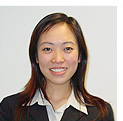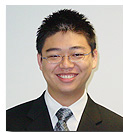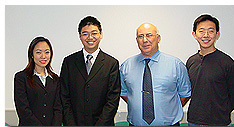Law students to compete in Scotland
"This introduction shows how successful it can be."
According to Mr Upham, "What we do in this competition is the sort of thing we'll be doing much more of in our teaching from now on. The School of Law moves to the four-year degree very soon, and interactive assessments will be carried out in the future. This introduction shows how successful it can be. We also had a lot of fun during the training." The other CityU team to take up the challenge in Hong Kong comprised second year SLW students Vania Kam Ching Man and Nikki Lam Kwan Wai . Another SLW student, Nicky Tse Sai Hang , who attended ICCC 2003 in South Africa as an observer, was responsible for organizing the Hong Kong Round this year. "Being an observer last year and seeing how a solicitor deals with clients was a valuable experience," Nicky said. He earned last year's chance by agreeing to undertake the hard work of managing behind-the-scenes logistics this year, and he feels it was well worth the effort.
The Hong Kong Round had two half-day sessions. Adjudicating the top two CityU teams in the morning session as they battled each other for the privilege of vying against HKU, were: Dr Bryan Bachner (SLW); Charles Ou (SLW); Paul Stephenson (Barrister); Annie Carver (HKU), Anne-Scully-Hill (SLW) and Eric Chiu (SLW). The afternoon session, in which each University's best team went head-to-head, was adjudicated by senior partner in Knight & Ho Christopher Knight ; Director of Professional Development MindTheme Consulting Terri Mottershead , and Associate Professor (SLW) Louise Barrington .
"Frankly, I was very impressed by the quality of these student competitors," Miss Barrington commented. "Their preparation, poise and teamwork would put many practising lawyers to shame! This whole exercise shows that, when we put our minds to it, the law schools can produce excellent practitioners with the legal skills so valued by the profession. What's more, they learn right from Day One, that the client comes first."
Lawyer-client interview role-play
The teams are evaluated on their practical skills, particularly the counselling and interview aspects of legal practice, as demonstrated in a simulated law-office consultation. First, the teams receive brief notes on the client's complaint; they prepare for and then role-play a lawyer-client interview. Finally, the teams explain how they would proceed to handle the hypothetical case. Up to 45 minutes is allowed for the process, before the international panel of seven judges, usually comprising at least two lawyers and a counsellor (often a social worker, minister or psychologist), critiques the teams.
Developed as a legal teaching technique in 1969 by the late Professor Louis M Brown of the University of Southern California Law Centre, the Client Counselling Competition was originally named the Mock Law Office Competition and initially just two schools competed each time. Then, in 1972, it was adopted by the American Bar Association, laying the foundations for the 1985 launch of the International Client Counselling Competition¡Xan opportunity for law students, teachers and legal practitioners to share practical educational and cultural experience. Today, the ICCC brings together winning teams of law students from national competitions around the world, including Australia, Canada, the Cayman Islands, England, Hong Kong, India, Malaysia, Scotland, South Africa, Sri Lanka and the United States. The ICCC is an affiliate of the International Bar Association.


